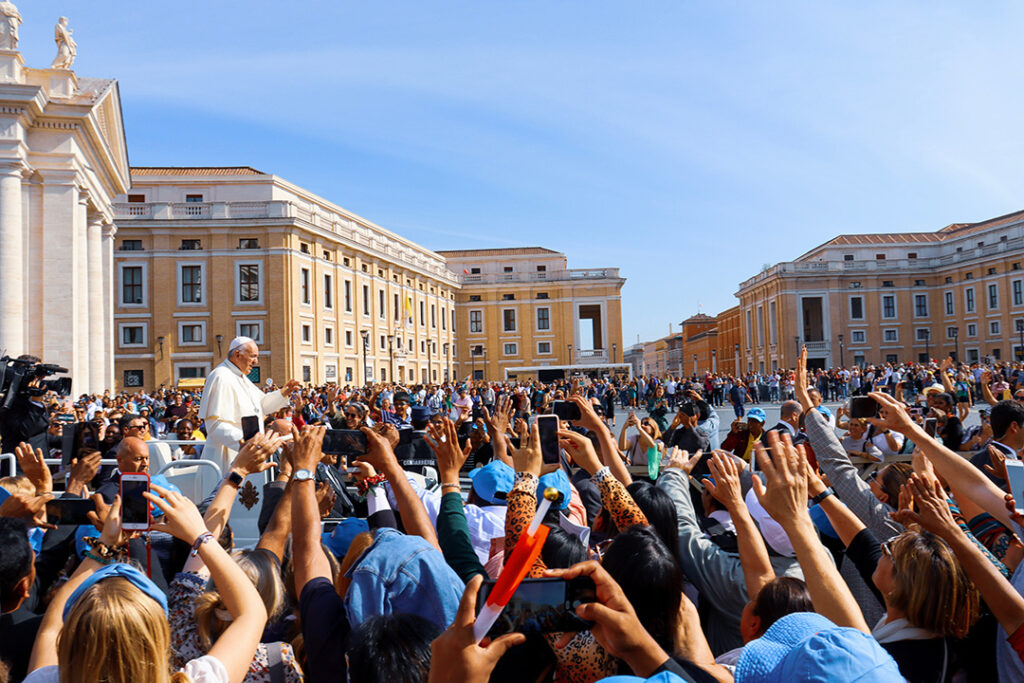How much impact is Pope Francis’ climate activism having?
How much impact is Pope Francis’ climate activism having?
Pope Francis has made climate change a priority of his papacy. But research shows his message is not cutting through. So what more can he do?
This weekly comment was written by Frazer MacDiarmid and reflects his personal analyses and opinions, rather than those of EARS.
Pope Francis has made climate change a priority of his papacy. Barely a month passes without a statement in support of climate action, or a condemnation of climate skeptics. But new research casts doubt on how much the pope is influencing ordinary people. What is the basis of Pope Francis’ activism and what should he do differently?
The climate change pope
The pope’s entire papacy has been oriented towards care for the earth. In 2013, his choice of the name ‘Francis’ for himself – after the nature-loving Saint Francis – already signaled his direction of travel.[1]
Over ten years on, in October 2023, Pope Francis made one of his most ferocious statements against climate change. Big industry, world leaders, climate change deniers, and “irresponsible” Western lifestyles all came under fire from the pontiff.[2]
Pointing to the shocking weather events of 2023’s summer, the pope also recently called upon world leaders to make material cuts to greenhouse gas emissions. “It is an urgent challenge, it cannot be postponed, it concerns everyone,” he said in a speech.[3]
On the World Day of Prayer for the Care of Creation 2023, Pope Francis spoke in theological terms about climate change: the world must give up fossil fuels and end “the senseless war against creation,” and people should repent for their “ecological sins.”[4]
The theological basis for Francis’ activism
All the world’s major religions have warned against the perils of climate change, as EARS has explored. Pope Francis’ most systematic treatment of climate change was his encyclical on ecology, Laudato Si’.[5] There he laid out the basis for why Christians need to act now, reasoning from theological principles.
The pope draws largely from Scripture. In the story of the Garden of Eden (Genesis 2) God appointed humans as ‘stewards’ over creation. This stewardship entails responsibility for the wellbeing of the earth, according to most interpreters. It is possible to judge someone’s morality by the way they treat God’s creation.[6] And there is strong justification in the New Testament for why Christians should be concerned about our climate, such as Earth’s creation through and for Jesus (Colossians 1:16).
Social justice plays a large role in Francis’ reasoning for climate action. Those most responsible for climate change are the most powerful (big corporations, wealthy countries), while those most affected are the poor and those with little influence: “We are not faced with two separate crises, one environmental and the other social, but rather one complex crisis which is both social and environmental. Strategies for a solution demand an integrated approach to combating poverty, restoring dignity to the underprivileged, and at the same time protecting nature.”[7]
For Pope Francis, the climate apocalypse and the apocalypse foretold by Jesus blend together: “Doomsday predictions can no longer be met with irony or disdain. We may well be leaving to coming generations debris, desolation and filth. The pace of consumption, waste and environmental change has so stretched the planet’s capacity that our contemporary lifestyle, unsustainable as it is, can only precipitate catastrophes.”[8]
Cut through?
But for all Francis’ nuanced theological reasoning, his message appears not to be getting through to many. A new survey has found that US Catholics are no more likely than the average American (57%) to think that climate change is an “extremely or very serious problem.”[9]
However, US Catholics come out well compared to some other denominations. Only 34% of evangelical protestants believe climate change is a serious problem. But compared to other religions, Christians are lagging behind. Asked the same question, 72% of non-Christian religious folk in the US answered yes.[10]
The survey showed that Catholics’ opinion on climate change was strongly linked to other demographic factors. You are much more likely to care about climate change if you are younger, vote Democrat, and are not non-Hispanic White, than if you are older, vote Republican, and are non-Hispanic White.[11]
The issue may be with the pope’s priests. In the US, over two fifths of regular mass attendants say there is “no discussion” of climate change in the sermons they hear.[12]
The pope on climate change: a new approach needed
Laudato Si’ – published just a few months out from the critical Paris UN Climate conference in 2015 – is thought to have materially influenced the positive outcomes achieved there.[13] And indeed of all the papacies so far, it is Francis’ that has the greatest claim for having moved the dial on climate change the most.[14]
However, as the Pew Research survey shows, a new approach is needed. Francis’ power and popularity is still considerable, but he must exercise his influence in a more effective way.
US leadership is still overwhelmingly Christian, and largely Catholic. Francis needs to exploit his influence more directly in the world’s biggest economy. He may be taken more seriously if he back specific proposals to tackle climate change, not just making general statements against it.
The Vatican’s uneasy relationship with China often leaves Francis with little more to say to President Xi than generic greetings.[15] The global fight against climate change presents Francis with an easy and uncontroversial topic to engage China on, especially as China struggles to maintain its place as a climate leader.[16]
Areas of agreement between religions are sometimes hard to come by, so Francis should band together with religious leaders in calling for faster climate action. There are some early signs Francis is pursuing this route.[17] [18]
This weekly comment was written by Frazer MacDiarmid and reflects his personal analyses and opinions, rather than those of EARS.
Our team of analysts conducts daily research on religion and society. In the past month, the topics of conflict and religious institutions were trending. Find out their relationships on the EARS Dashboard.
Sources
[1] How 10 Years of Pope Francis Has Changed Climate Action
[2] Pope Francis lambasts climate change skeptics and ‘irresponsible’ Western lifestyles
[3] Pope urges world leaders to do more to tackle climate change
[4] Enough with fossil fuels, Pope says in latest climate appeal
[6] Judaism and Climate Change
[7] Laudato Si’, 139.
[8] Laudato Si’, 161
[9] The pope is concerned about climate change. How do U.S. Catholics feel about it?
[10] The pope is concerned about climate change. How do U.S. Catholics feel about it?
[11] The pope is concerned about climate change. How do U.S. Catholics feel about it?
[12] The pope is concerned about climate change. How do U.S. Catholics feel about it?
[13] How 10 Years of Pope Francis Has Changed Climate Action
[14] How 10 Years of Pope Francis Has Changed Climate Action
[15] In overture to China, pope sends greetings to a ‘noble’ people
[16] The U.S. Can Steal China’s Climate Leadership Crown
[17] Interreligious dialogue leads to care for planet, pope tells Buddhists
[18] Pope Francis joins world faith leaders in urgent climate appeal ahead of COP26






